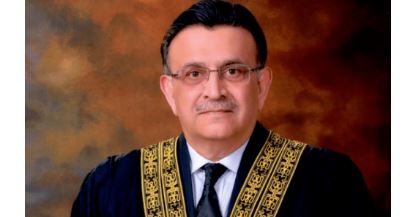ISLAMABAD, JUL 26: The Supreme Court of Pakistan Tuesday resumed hearing the case of the Punjab chief minister’s election — where Hamza Shahbaz defeated Pervez Elahi — for the third day.
During the hearing, Punjab Assembly Deputy Speaker Dost Mazari’s lawyer Irfan Qadir and PPP lawyer Farooq H Naek told the court that they will not be participating in the hearing as a boycott is being observed.
Chief Justice Umar Ata Bandial then extended an open invitation to all the parties to assist the court in reaching a fair and just decision in the high-profile case.
Elahi, who had been defeated on July 22 after 10 PML-Q votes were rejected by Deputy Speaker Punjab Assembly Dost Mazari, had challenged the ruling in the SC.
The SC formed a three-member bench to hear the case, but the coalition government objected to it and demanded a full court take up the matter.
However, after hearing arguments from all sides for nearly eight hours on Monday, the SC decided not to form a full court bench, saying that the same bench would hear the case.
As the SC decided not to form a full bench, the ruling coalition and the Pakistan Democratic Movement (PDM) decided to boycott the apex court’s hearing.
Today’s hearing
Qadir told the bench that his client had told him to not be a part of the proceedings as a country-wide boycott of the judiciary is being observed.
Qadir told the SC that he would challenge the apex court’s decision relating to the full court — wherein the top court decided to not form a full bench to hear the case.
Following Qadir, PPP lawyer Farooq H Naek came to the rostrum and informed the CJP that he would not be part of the proceedings.
At this, the CJP told him that he “is not a party in the case”.
The CJP said that “no legal” grounds were presented before the court; arguments were presented only regarding the party head’s directions; the court arrived at the conclusion that in the current case, there was no need for a full bench.
“I will change my opinion only when concrete reasons are given.”
CJP Bandial said the real question was who could give directions to party lawmakers. The constitution clearly states that the parliamentary party will give directions to MPs, he said.
“There is no need for further arguments in this case. We will give priority to wrapping up this case as soon as possible,” he said.
CJP Bandial said that forming a full court was tantamount to unnecessary delay.
“The formation of a full court and then hearing of the case could have been delayed till September as leaves are being taken in the court.”
Meanwhile, the top court sought assistance on the matter relating to directions by the party head or a parliamentary party.
“Assist the court over the legal questions or we will set ourselves aside from the bench,” CJP Bandial told Barrister Ali Zafar, the counsel of Elahi.
“People sitting on my right side have unanimously decided to boycott the proceedings of the court,” he said, adding that thankfully, they have enough grace to sit in court to hear the proceedings.
Giving his arguments in the case, Zafar said that the petitions against the 21st Amendment were dismissed by a ratio of 13:4 in a full court.
However, many judges gave different reasons for dismissing the petitions, he added.
Zafar told the court that the constitution mentions that the parliamentary party will give directions to the lawmakers about voting.
At this, the CJP questioned whether the party head and parliamentary party were two separate entities.
Zafar said that they were two separate entities.
Justice Ahsan then said, according to the constitution, the party head follows the parliamentary party’s directions. The CJP said that the parliamentary party does not make a decision unilaterally.
“The parliamentary party is informed about the party’s decision, and based on that, it takes a decision.”
During the proceedings, Justice Ahsan questioned: “Where has the word parliamentary leader been used?”
The PML-Q counsel replied that the world “parliamentary party” is used in the Political Parties Order 2002.
At this, Justice Ahsan remarked that the word “parliamentary leader” instead of “parliamentary party” is just a mistake.
Additional Attorney-General (AAG) Amir Rehman then came to the rostrum and said he wanted to present a few suggestions before the court.
“Has the federal government decided to separate itself from the coalition government?” the CJP asked.
The AAG told the top judge that he will assist the court under Article 27.
At this, the CJP extended an open invitation to assist the court to reach a fair and just decision in the high-profile case.
The court then went on a break for an hour and said that the hearing will resume at 2:30pm.

















